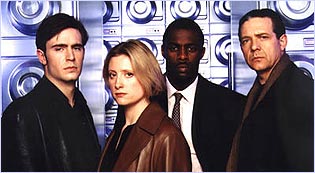I think like a continuity checker, but E thinks like a villain!
While watching Robin Hood, Season 2, Episode 9: Lardner’s Ring: (Warning, spoilers below!)
.
.
.
Me: So how do they know which tree to go to?
(Two scenes later, the group in question are very dramatically stumbling about sherwood forest looking for the aforementioned tree).
(Guy of Gisborne threatens to chop off a woman’s finger if villagers don’t come forward with information. Robin’s gang distract Guy, then turn and run, leading him away.)
E: I’d just turn around and chop her finger off.
(Robin Hood and maid Marian are stuck up a tree with a much sought-after homing pigeon, surrounded)
E: I’d just burn down the tree. It would be quicker.
Me: But wouldn’t that kill the pigeon?
E: They (the bad guys) don’t need the pigeon alive!
(Robin and Marian use delaying tactics, counting on their sturdy tree to be slow to fell, but are caught by surprise when Guy douses the base of the tree in pitch, in preparation for burning them out).
(Later, the pigeon seems to be escaping with its vital message. Guy’s archers are unable to hit it. The sheriff rides up)
E: I bet he’s got a falcon.
(The pigeon soars, triumphant music sounds, then the sheriff’s henchman pulls the hood off a falcon, and the sheriff says ‘fetch!’. The Falcon does so.)
 Of course, neither of us are quite as villainous as Robert Llewellyn. The next show we watched was an episode of Scrapheap Challenge, in which teams must devise vehicles for carrying a full, open topped barrel of yellow goo around a 4WD course without spilling any. The catch? Each team must complete three rounds, and will be scored based on the total amount left in their vehicle’s barrel at the end. In the final round, the teams drive each other’s vehicles.
Of course, neither of us are quite as villainous as Robert Llewellyn. The next show we watched was an episode of Scrapheap Challenge, in which teams must devise vehicles for carrying a full, open topped barrel of yellow goo around a 4WD course without spilling any. The catch? Each team must complete three rounds, and will be scored based on the total amount left in their vehicle’s barrel at the end. In the final round, the teams drive each other’s vehicles.
Evil!


